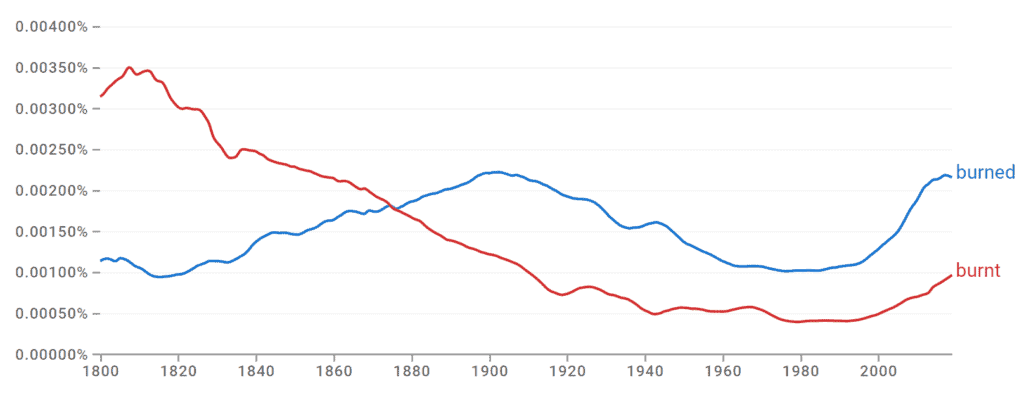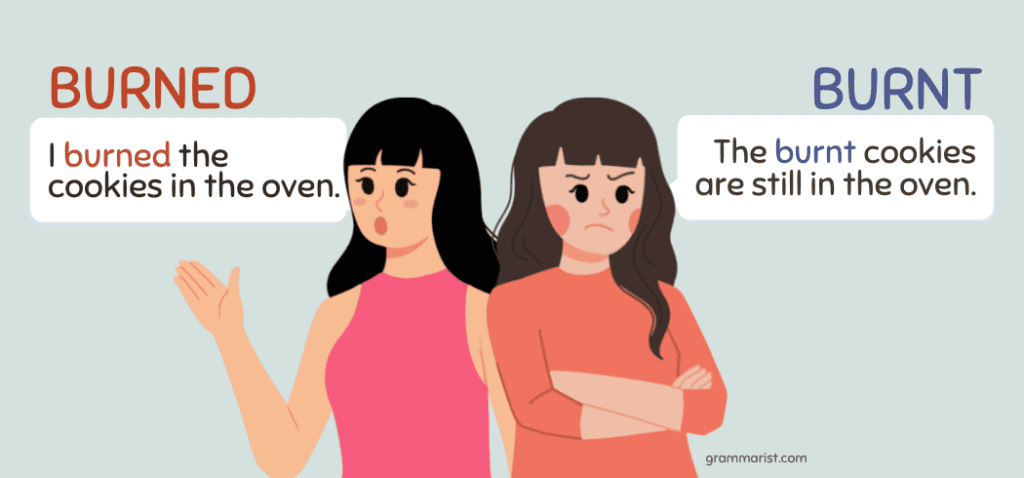If you’re on this page, you’re probably asking, is it burned or burnt? Is burnt a word? Both burned and burnt can be past participle and past tense of burn. Read on as I teach you the differences between the words burned and burnt in this article.
Burned vs. Burnt: What’s the Correct Spelling?
Both burned and burnt are different versions of the verb burn. Burn means:
- To produce flames and heat while consuming a material.
- To destroy, damage, or injure by heat or fire.
We use burned and burnt interchangeably as the past form and past participle of burn. But some stylebooks have specific preferences on the use of burned and burnt.

This Ngram shows the use of the past tense verbs burned vs. burnt. It reveals that burnt became more popular from the 1800s to the 1870s. Later, burned became more commonly used. But both are acceptable spelling and acceptable forms if used properly.
American English on Burned vs. Burnt

Only American English makes a distinction between burnt and burned. Use burned as the past tense of burn. For example:
- I burned the cookies in the oven.
Burnt is the past participle form of burn. We usually use it as an adjective, so it comes before a noun. For example:
- The burnt cookies are still in the oven.
Other English Variants on Burned vs. Burnt
Outside the American variant, burned and burnt are interchangeable and acceptable past-tense forms. We can use burned as both past participle and simple past forms of burn. For example:
- He burned all the old pictures. (Burned as simple past form)
- The pictures were burned to ashes. (Burned as past participle)
We can also use burnt as both past participle and simple past forms of burn. For example:
- The perfume smells like burnt cotton candy. (Burnt as past participle)
- She accidentally burnt the lasagna she was baking. (Burnt as simple past form)
Burned and Burnt in Sentences
- My dad ran back into the house and saved every one of us. He was badly burned by the fire but we’re all alive today thanks to him.
- This bacon is burnt to a crisp!
- Did you know there’s an actual church called The Burnt Church?
- I love watching roasts. Celebrities getting burned are good entertainment.
- I walked along the burnt ruins of the old city, and I could picture what once was; a beautiful community built at the bottom of a volcano.
Is Burnt a Slang?
The slang burnt is the past tense of the verb insult or defeat. For example:
- I burnt him in the game.
Is It Sunburned or Sunburnt?
Both sunburned and sunburnt are correct forms. For example:
- She got sunburned from her summer trip.
- She got sunburnt from her summer trip.
Is It Burnt or Burned Out?
The verb phrase burn out means to cause to become worn out or inoperative. Both burned out and burnt out can be used as past tense, past participle, and adjective forms. For example:
- I feel burned out at work.
- I feel burnt out at work.
Burned and Burnt Are Correct
Now you should know the similarities and differences between burned and burnt. My guide confirmed that burned and burnt can be simple past and past participle forms of burn.
But American English considers burned as the simple past form of burn, while burnt is the past participle.

Comments are closed.